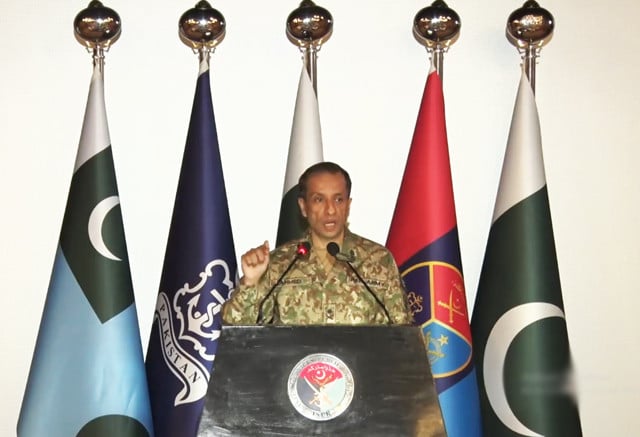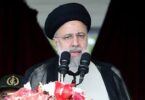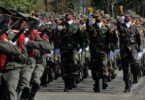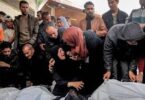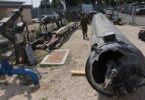RAWALPINDI (APP): Director General Inter-Services Public Relations (DG ISPR) Major General Ahmed Sharif Chaudhry on Tuesday said the Pakistan Army along with civil and military intelligence agencies is conducting over 70 intelligence based operations (IBOs) on the average across the country to stem out the recent wave of terrorism and resurgence.
The armed forces spokesperson was holding a media briefing on the prevailing security situation, counter-terrorism efforts and IBOs to contain terrorism activities across the country. Major General Chaudhry said the security forces have so far conducted some 8,269 IBOs since 2023 and apprehended 1,378 terrorists and killed 157 among them during the anti-terrorism operations. He added that for the past many months, the terrorists activities were underway to destabilize peace in Balochistan and Khyber Pakhtunkhwa (KP) provinces.
“The security forces are focusing on it. The civil and military law enforcement agencies (LEAs) have made wonderful measures. However, the Tehreek-e-Taliban Pakistan (TTP) and Baloch Separatist organizations have been found behind all that,” the DG ISPR said. He said since the withdrawal of NATO forces from Afghanistan, some 436 terrorist incidents took place that martyred 293 innocent civilians and injured 521 individuals. “Today, Alhamdulilah (Thanks to Allah) with the support of the nation, there is no ‘No Go Area’ in Pakistan,” he added.
The armed forces spokesperson underlined that there were few terrorist groups making hostile activities whereas proper efforts were underway to exterminate them. He added that a large cache of illegal weapons, ammunition and ordnance was being recovered from the terrorists during various IBOs and further recovery was underway. The Peshawar Police Lines and Karachi Police Office (KPO) attacks showed the nefarious intentions of the country’s enemies, whereas these terrorists had no contact with Islam, he added.
He informed that Peshawar attack was done by Jamaat ul Ahrar and the attacker hailed from Afghanistan. He added that the Peshawar attack facilitator was arrested who had trained the suicide attackers and received a sum of Rs7.5 million for facilitation and execution of the attack. “The attack on Peshawar Police Lines was postponed twice due to lack of the people offering prayer in the mosque. In the third time, the attack was executed in the presence of maximum people,” the ISPR DG said. He added that the KPO attack facilitator Aryad Ullah Waheed alias Abdul Aziz was also arrested who received directions from TTP leadership and got Rs 3 million whereas he bought a car from that money to execute the attack.
The ISPR DG mentioned that during the anti-terrorism operations since January 2023, some 137 officers and soldiers have embraced martyrdom and 117 got injured. He said that the nation paid tribute to these brave sons of the soil. He added that the intelligence agencies’ day and night efforts had helped to arrest Baloch terrorist commander Gulzar Alam alias Shambey.
Pakistan armed forces’ efforts were not hidden to any and if compared to the world forces under which circumstances and resources it fought against terrorism, there was no precedent to it, he added. “Our fight will continue till termination of the last terrorist,” he vowed. Highlighting the Western Border Management measures, the ISPR DG said almost 98 percent border fencing along 2,611 kilometers Pak-Afghan international border was completed and 85 percent fencing was completed along Pak-Iran border.
He added that 85 percent construction of forts along Pak-Afghan and 33 percent along Pak-Iran border was completed. During this entire process, he said many soldiers of Pakistan Army embraced martyrdom to complete fencing. He added that 65 percent area in the newly merged tribal districts was cleansed from mines as some 98,000 mines have been neutralized.
Agencies add: In response to a question, he said the Ministry of Defence had already given a briefing to the Supreme Court regarding the deployment of troops for elections, which was based on “ground realities”. The defence ministry briefed the apex court last week on why the government could not provide army personnel for elections in Punjab and Khyber Pakhtunkhwa — and the report has not been made public yet.
The government has repeatedly maintained that the polls cannot take place not only due to the ongoing economic turmoil, but also due to terrorism threats, and with the army busy in counterterrorism operations, it could not allocate security forces for elections.
To a question about what was in the report that the defence ministry had submitted to the top court, Maj Gen Chaudhry said that had there been a need to make the briefing provided to Chief Justice Umar Ata Bandial public, then it would have already been disclosed. “Those talks were held just between the institutions,” he said. “It is not in the interest of the nation, country, and the army to push the armed forces into politics,” the military’s spokesperson remarked, a position that his predecessors have also maintained.
The ISPR DG added that it is the government’s prerogative to summon the Pakistan Army under Article 245 for election security or during natural disasters. At the start of the news conference — his first after taking over the post — he said the purpose was to elaborate on the army’s professional activities, including analysing its counterterrorism operations.
“The contacts between the Tehreek-e-Taliban Pakistan (TTP) and Baloch [insurgent] organisations and foreign intelligence agencies have been proven.” Pakistan’s civil and military agencies took great steps against terrorists, he said. Giving a breakdown of the menace of terrorism during the current year, he said 436 incidents had occurred, in which 293 people were martyred and 523 injured.
During this period, security forces conducted 8,279 intelligence-based operations (IBOs), in which 1,535 terrorists were killed. Around 70 IBOs were being conducted daily, he added. “There is no no-go area in Pakistan,” he emphasised. However, terrorists were still disturbing the country’s peace. The ISPR DG further said that 137 security officials have been martyred so far this year while 117 have been wounded. “The war against terrorism that Pakistan has fought is unprecedented and will continue till the last terrorist is eliminated,” he asserted.
“Terrorist organisations and their facilitators’ have no ideology, religion or faith. They attack mosques, police, religious scholars, mediapersons and citizens,” he said. He also expressed sadness that the police were blamed for any terrorist incident no matter how small. The police had given countless sacrifices, he said.
Referring to the suicide attack on a mosque in Peshawar in January, which claimed the lives of over 70 people, the ISPR DG said the blast was carried out by the banned militant group Jamaat-ul-Ahrar on the TTP’s orders. “The attacker belonged to Afghanistan. The facilitators have been arrested. These terrorists were trained in different areas of Afghanistan.”
The masterminds of an attack on the Karachi police chief’s office have also been arrested, he said, adding that the terrorists had taken Rs3 million to carry out the attack. “No individual or group will be allowed to take the law into their own hands,” he stressed. “Attempts to sabotage CPEC (China-Pakistan Economic Corridor) and other projects are being thwarted. All projects are being provided complete security. “Different social welfare programs have been announced after slashing the army’s budget. The navy and airforce have also participated in relief activities.”
The ISPR DG said the army had reviewed its expenditures in view of the country’s economic situation. “Petroleum, ration and non-operational movement are being reduced. “The journey towards permanent peace has begun.”
Maj Gen Chaudhry further said around 3141 kilometre-long border has been fenced along the frontiers with Afghanistan and Iran to prevent infiltration of terrorists. He said 98% border with Afghanistan and 85% with Iran has been fenced, while 85% of forts along the Afghanistan frontier and 33% with Iran have been completed. He further said that 65% of erstwhile tribal areas have been cleared of land mines.
The ISPR DG added that it isn’t possible to completely seal the border between the two countries, and in the local context, Pakistan is home to over five million Afghan refugees, while the movement of people between the borders of the two states was substantial. “On an annual basis, around 20,000 people cross the Pak-Afghan borders,” he said, noting that the local authorities were in talks with the interim Afghan government over border management.
Highlighting measures for the socio-economic uplift of the people, the ISPR DG said that 3,654 projects are being completed at a cost of Rs162 billion in Khyber Pakhtunkhwa, while 95% of the affected population has returned to homes. He said that around 14,000 people have been given jobs in Pakistan Army and the Frontier Corps under Youth Employment Scheme.
Similarly, over 1,200 students are getting an education in various institutions. The military’s spokesperson added that with the growing population, Pakistan also faces a food security challenge. “Governments in developed countries also use the army to improve agriculture. In this regard, the federal and provincial governments will decide what Pakistan Army’s role will be,” he said. The Punjab government has allocated over 45,000 acres of land to the Pakistan Army for a “Corporate Agriculture Farming” project in the shape of a “joint venture” to enhance the crop yield in order to ensure food autarky.
However, officials in the Punjab government were prompted to issue a clarification and provide a rationale for allocation of land to the Pakistan Army. A senior government official, on the condition of anonymity, said: “From the onset, it should be clear that the ownership of the land remains with the Punjab government.” “The Pakistan Army is only providing a management structure; the corporate sector and local farmers will also be involved in the cultivation process,” he added.

